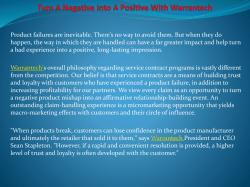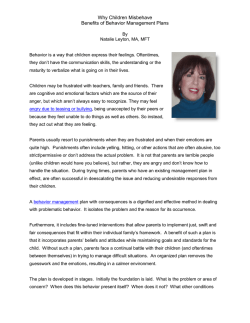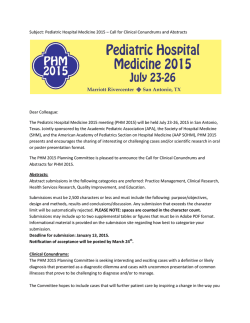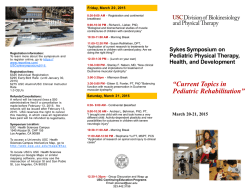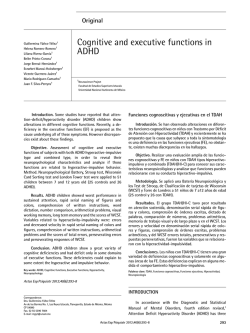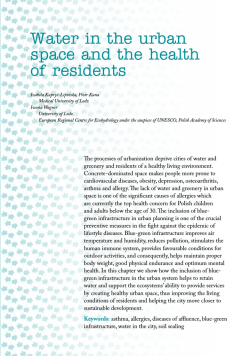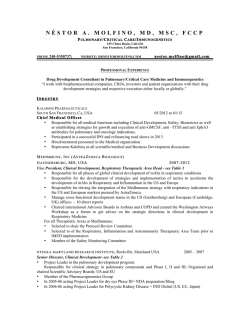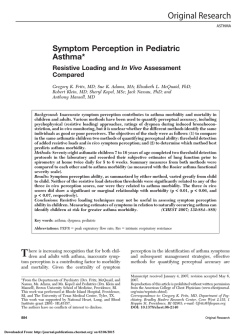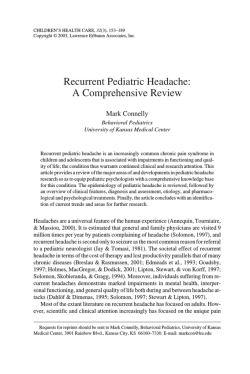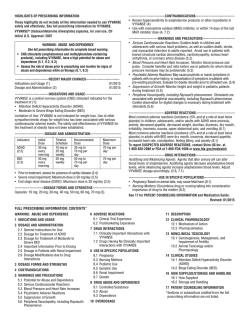
Download the PDF Version
Hand in Hand News A Quarterly Newsletter from Advanced Pediatric Associates Volume 36, Winter 2015 Happy Anniversary APA Stapleton! Kids Triathlon Bladium Kids Fest Sam Gary Library Parenting Workshops Stapleton Office Celebrates One Year Have you been to our Stapleton office? Located on the 2nd floor of the Central Park Professional Condominiums, our Stapleton office is convenient to neighborhoods north and south of I70, including Stapleton and Northfield, north Aurora, Reunion, Green Valley Ranch, Lowry, Park Hill, Hilltop and The Highlands. Our Stapleton office offers patients the same quality of care and service that patients love at our other office locations, in a bright and friendly new office environment. In addition to weekday hours, our Stapleton office is open Saturdays from 8 - 11 am. Expecting a baby? We invite you to schedule a FREE “Meet the Doctor” visit with one of our physicians, so that you may learn more about our practice and caring for your newborn. Advanced Pediatrics is committed to bringing the most advanced pediatric care available to the communities we serve. Our providers are active members of our communities, often involved on committees at Children’s Hospital Colorado and other local pediatric health related programs, as well as with the University of Colorado Health Sciences Center pediatric teaching program. If you have friends or family living in or around the Stapleton community, we invite them to visit our Stapleton office! Inside This Issue Practice News page 2 Congratulations Dr. Stevens & Dr. Payne! Important Reminders Regarding Asthma, ADHD & Referrals Have You Enrolled in MyChart? Saturday Hours & Nurse Line Visit Our Website Health & Safety page 3 Dealing with Food Allergies Our Commitment to the Stapleton Community Many of our Stapleton providers live and raise their own children in the Stapleton & Park Hill communities. In addition to getting to know new families in our office, our Stapleton providers have enjoyed meeting residents at the following Stapleton community events sponsored by Advanced Pediatrics: Movies on the Green 4th of July Parade & Pancake Breakfast Preventing Diaper Rash Home Remedies for Sick Kids No OTC Cough & Cold Medicines for Children Under 4 Central Park Professional Condominiums 2373 Central Park Blvd., #202 Denver, CO 80238 Building a Better Community When to Keep Kids Home from School Focus on Wellness page 4 Winter Safety Dr. Alison Auster Offers Free Parenting Workshops In September, Dr. Alison Auster, from our Stapleton office, and Lauren Ross, LCSW, began offering FREE parenting workshops at the Stapleton Sam Gary Branch Library. These workshops are generally offered once a month on Sunday afternoons, and are free for interested parents. Topics covered so far include: September — Parenting Styles October — Behavior & Discipline: The Early Childhood Years November — Behavior & Discipline: Elementary & Middle School Years January — Understanding Your Child’s Developmental & Academic Needs Alison Auster, MD APAStapleton Office Additional parenting workshops will be offered throughout 2015. “Like Us” on Facebook to receive announcements on upcoming dates & topics. Hand in Hand for Healthier Infants, Children & Adolescents News from Our Practice Congratulations Dr. Stephanie Stevens and Dr. William Payne! Dr. Stevens Named Colorado Pediatric Collaborative (CPC) Board Member Dr. Payne Named Pediatric Department Chair—Parker Adventist Hospital CPC is a nonprofit partnership between Colorado Pediatric Partners, Physician Health Partners and Children’s Hospital Colorado. It is the first organization of its kind in the Denver area to combine the expertise of a hospital, primary care physicians, specialists, and a medical management company to improve the overall quality of care for pediatric patients. Dr. Stevens is one of nine members of the Board of Directors at CPC. Dr. William Payne was recently appointed Pediatric Department Chair by the Board of Directors at Parker Adventist Hospital. Dr. Payne will serve as a liaison between Parker Adventist Hospital and community pediatricians concerning pediatric care at the hospital. He will be involved in helping with any changes in clinical guidelines and protocols and the credentialing of pediatricians at Parker Adventist Hospital. Important Reminders Regarding Asthma, ADHD & Referrals Asthma ADHD Does your child have asthma or history of wheezing? Ask our providers about having your child be part of our asthma registry. Our asthma registry allows us to work together to better manage your child’s asthma care and reduce the frequency of sick visits or trips to the emergency department — which occur more frequently with poorly controlled asthma. If your child has not had an asthma visit in the last three to six months, please call our Patient Care Line at 303699-6200 to schedule one at your earliest convenience. Does your child have ADHD? It is very important that your child is seen in our office every 6 months for a follow-up evaluation so that you may continue to receive medication refills. You may download the 6-month follow-up paperwork from the “ADHD” page of our website (see “Parent Handouts / Diagnostic Forms”). The 6-month follow-up packet must be submitted to our ADHD department in order to schedule your child’s 6month follow-up appointment. In addition to ADHD paperwork, the “ADHD” page of our website provides a wealth of helpful resources for families who would like to learn more about ADHD. To schedule an appointment for an ADHD evaluation or follow-up visit, please contact our ADHD Department at 720-974-7188. Referrals Has your insurance changed? Please make sure that our offices have updated insurance information on file for your children. Having your children’s medical records updated with any insurance changes is especially important if you are in need of a referral to an outside specialist, so that we may refer a specialist who accepts your insurance. Please call our Referrals Department at 720-974-7188 with any questions regarding referrals. Saturday Hours & Nurse Line Saturday Office Hours scheduled during regular weekday hours. Did you know that Advanced Pediatrics offers Saturday office hours from 8 am - 11 am at two office locations: Calling Our Nurse Line www.AdvancedPediatricAssociates.com Our triage nurses are available over the phone during business hours to help you determine if your child needs to be seen in our office. If your child is having breathing issues or has sustained an injury, it is advisable to have your child with you when you call. This will help our nurses to best assess his or her symptoms and help you make the best possible decision regarding care. To speak with one of our registered nurses, please select option # 2 when calling our Patient Care Line. Have you checked out our website’s Pediatric Health Library? From Newborn Care, to ADHD, to Parenting Tips…. Our website offers comprehensive pediatric health related resources for parents! Centennial — Village Plaza at Smoky Hill 5657 S. Himalaya St. #100, 80015 Stapleton — Central Park Professional Condominiums 2373 Central Park Blvd., #202, 80238 Our Saturday office hours are available for newborn and sick visits only. All well care and consultation visits must be Visit Our Website Have You Enrolled in MyChart? Did you know that MyChart is available to APA patients? MyChart is an online patient portal which makes it convenient for parents to access medical information and communicate with our staff. Sending a message to our staff, printing your child’s immunization records, requesting a prescription refill, and viewing lab results are just some of the online options parents have with MyChart. Next time you are in our office, please ask our reception staff for a MyChart activation request card to set up your account. Read more about MyChart on the “Online Payments, MyChart & Forms” page of our website. Page 2 Hand in Hand News Health and Safety Tips Dealing with Food Allergies The most common food allergies in children are caused by milk, eggs, peanuts, tree nuts, soy and wheat. If your child shows symptoms of an allergy after eating a particular food, remove it from his or her diet and discuss the symptoms with your provider or one of our registered nurses. Depending on the symptoms, your provider may recommend allergy testing to confirm what allergens your child is sensitive to. For any life threatening allergic reaction, call 911. If your child has a known food allergy, teach your child to follow these food allergy rules: Some tips for parents of children with known food allergies: Wash your hands before eating or touching Read food labels carefully and do not your nose, eyes or mouth. Only eat food that is made for you. It is NOT safe to share food. If you are unsure if a food is safe to eat, ask an adult who knows about your food allergy. Don’t share spoons, forks, knives, cups, bottles or straws. If you get something you are allergic to on your skin, ask an adult for help, clean it off, and wash your hands. If you feel any allergy symptoms, tell an adult immediately. serve your child any food product without an ingredient label. Do not buy food from bulk bins as ingredients may be cross-contaminated. Do not buy food with precautionary statements such as “may contain” or “processed in a facility…” Note that labeling laws may not cover products such as vitamins, lotions, pet foods, modeling clay, finger paint etc. Be cautions of imported products which may not follow US labeling standards. Ask your provider if you should have an Epi Pen for your child’s allergy. Preventing and Treating Diaper Rash Diaper rash is very common in babies and caused by irritation from stool and urine on the skin. Here are some tips to keep your baby’s diaper area healthy: Most diaper rashes respond to 3 days of If your child has diar- warm water cleansing and air exposure. If not, or rash is bright red, your baby may have a yeast infection. Change diapers frequently. When pos- For yeast infection, use an anti-yeast cream, sible, change diaper immediately after baby has had a stool. such as Lotrimin, 3 times a day until rash is gone. rhea and a rash, you may use a protective ointment such as A&D or Desitin. Otherwise, these are usually not needed. Rinse skin with lots of warm water at each If skin is very raw, soak in warm water with 2 diaper change. Do not use baby wipes. Use a mild soap (Dove) only after stools. Expose baby’s bottom to air as much as possible. tablespoons baking soda for 10 minutes, 3 times a day, and then apply Lotrimin. For a sore or scab on the end of the penis apply an antibiotic ointment, such as Polysporin, 3 times a day. Home Remedies for Sick Kids Every parent wants to do what they can to help sick children feel better. Here are home remedies for sick kids: minute, and then suction with a rubber bulb. Repeat in other nostril. For children over age 1, put 3 drops of saline in each nostril, wait a minute, and then suction or have child blow nose. Repeat up to 4 times a day. Have sick kids drink plenty of fluids — Quiet their cough — A cough is helpful for water, milk, formula, apple juice, popsicles, gelatin, chicken broth etc. Give them extra time to sleep and rest — keep them home from school or limit activities until they are feeling better. Soothe their sore throat — Warm chicken broth helps sooth a sore throat for children over 1 year. Children over 6 years may also suck hard candy. Children over 8 years may gargle with warm salt water twice a day. Acetaminophen or ibuprofen will also reduce the pain. Clear their stuffy nose — For babies put one drop of saline in one nostril, wait a Volume 36, Winter 2015 clearing your child’s lungs, but too much coughing may exhaust your child. Children over age 1 may be given 1/2 to 1 tsp honey to quiet a cough. Those over age 6 may be given cough drops. Use a humidifier — A cool mist humidifier will help loosen mucus in nose and lungs to help kids breath easier and reduce coughing. (Breathing in steam from a warm shower is also helpful.) Treat fever & pain — If your child has a fever over 102° F or has muscle aches or a headache, you may give acetaminophen or ibuprofen. (Call us for fever lasting over 3 days or in infants under 12 weeks.) If your baby’s dia- per rash does not improve after 3 days, call our office. No Over the Counter Cough or Cold Medicines for Children Under 4 Years These do not work for younger children and can actually be harmful when given improperly or in combination with other medications. When to Keep Kids Home from School Sometimes it is hard to know whether your child is sick enough to stay home from school. Here are a few quick questions to guide your decision: Does your child have a fever? A temperature of 101° F or higher is a good indication of illness and children should stay home from school. Does your child feel well enough to participate in class? If not, let your child rest at home until feeling better. Do you think your child is conta- gious? If your child may have the flu, pink eye or strep throat, call us to schedule a sick visit and do not send your child to school. Other symptoms of contagious illness may include: severe cough, vomiting, diarrhea, rash etc. Page 3 Focus on Wellness Newsletter Editor Winter Safety Elaine Hehemann Physicians Michael L. Kurtz, MD Freeman Ginsburg, MD Stephanie S. Stevens, MD Bradley D. Kurtz, DO Jeanne Oh, MD Jill Kramer, MD Suzanne L. Rogers, DO Nancy J. McDermott, MD Deborah Chen-Becker, MD Danielle M. Clancy, MD William S. C. Payne, MD Bird Gilmartin, MD Bethany M. Carvajal, MD Melissa Michels, MD Alison Auster, MD Winter is here and along with fun in the snow comes occasional bitter cold temperatures. How should you protect your kids when temperatures fall below freezing? Average low temperatures during the winter in the Denver area are typically in the teens, with record lows going below zero. If you are traveling to the mountains, temperatures can be even colder. Dressing children appropriately for the weather and minimizing time spent outdoors when wind-chill temperatures fall too low are key to preventing frostbite and hypothermia. What to Wear: Dress in layers with a waterproof outer layer. Make sure boots and gloves or mittens are well insulated to keep fingers and toes warm and dry. Don’t forget a warm hat and scarf or facemask to protect the ears, nose and lips. Go inside and change clothing if wetness spreads beyond outer waterproof layer. Hypothermia: Hypothermia develops when a child’s temperature falls below normal due to exposure to colder PAs and PNPs Nancy Barber Starr, PNP Brigette Denning, PA Joy Diamond, PNP Maggie C. Hawkins, PA Heather Meister, PA Lynda Melton, PA Jacob H. Perry, PA Kara Scholl, PA Kimberly Thomas, PA Linsey Weller, PA Administrator temperatures. This often happens when kids play outdoors in extremely cold weather without proper clothing or when clothing gets wet. Hypothermia occurs more quickly in children than in adults. Signs of hyperthermia include shivering, lethargy, clumsiness and slurred speech. If you suspect hyperthermia, call 911 immediately. Until help arrives, take the child indoors, remove wet clothing, and wrap child in blankets or warm clothes. Frostbite: Frostbite happens when the skin and outer tissues become frozen and is most common on the fingers, toes, ears and nose. Signs of frostbite include pale, gray and blistered skin or skin that feels like it is burning or numb. If frostbite occurs, come inside and place frostbitten area in warm (not hot) water —104° F (about the temperature of most hot tubs) is recommended. Warm washcloths may be applied to frostbitten nose, ears and lips. DO NOT RUB FROZEN SKIN. Denise Hall Patient Care Line 303-699-6200 Village Plaza at Smoky Hill 5657 S. Himalaya St., #100 Centennial, CO 80015 I-225 Medical & Business Plaza 1300 S. Potomac St., #156 Aurora, CO 80012 Parker Adventist Professional Building 9397 Crown Crest Blvd., #330 Parker, CO 80138 Central Park Professional Condominiums (Stapleton) 2373 Central Park Blvd., #202 Denver, CO 80238 After a few minutes, dry and cover child with clothing or blankets and give something warm to drink. If numbness continues for more than a few minutes, call our office. The Denver area and nearby mountains offer many opportunities for family fun in the snow. Keep you children safe in the snow this winter by following these common sense safety tips: Sledding: Keep sledders away from motor vehicles and avoid sledding in crowded areas. Supervise kids while sledding and keep young children separated from older children. Sledding feet first or sitting up and wearing a helmet helps to prevent head injuries. Make sure sled is structurally sound and free from sharp edges. Steerable sleds are preferable to snow disks or inner tubes. Sledding hill should be free of trees or fences, not icy or too steep, and end with a flat runoff. Skiing and Snowboarding: Have children taught to ski or snowboard by a qualified instructor in a program designed for kids. Never allow your children to ski alone. Young children should always be supervised by an adult. ALWAYS wear a helmet when skiing and snowboarding. Make sure equipment fits properly. Skiers should wear safety bindings that are adjusted at least every year. Snowboarders should wear gloves with built-in wrist guards. Eye protection or goggles should also be used. Slopes should fit the ability and experience of the skier or snowboarder. Avoid crowded slopes — especially with younger children. Avoid skiing in areas with trees and other obstacles. www.AdvancedPediatricAssociates.com
© Copyright 2026
